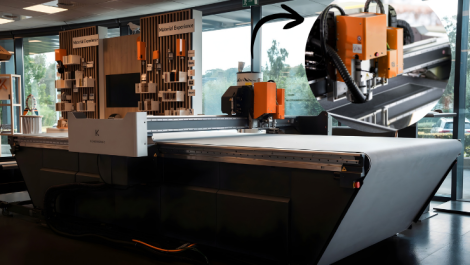Five months into his new job as chief executive of the BPIF (British Print Industries Federation), Charles Jarrold talks to Andy Knaggs about his plans for the future.
A matter of days into his tenure as chief executive of the BPIF, Charles Jarrold broke his ankle in a cycling accident. It was an inauspicious start and instantly put his planned 30, 60 and 90-day assessment process behind schedule.
Five months on, he is still in the process of engaging with people and assessing but certain things about the organisation, its present and its future, have crystallised in his mind. One of these is that the BPIF is no longer in the turnaround mode that marked the leaderships of Mr Jarrold’s predecessors Michael Johnson and Kathy Woodward. ‘We are more about sustainable success and building on what has been done,’ he commented.
He came to the job following the passing of Kathy Woodward last year, and it is only right to report his words of tribute. ‘Her strongest legacy is the strength of the training offering, especially the Level 5 (NVQ Diploma in Management). More broadly, she picked up where Michael Johnson left off and she continued that process of making the BPIF fit for purpose in an industry that was clearly changing and has continued to change. That means having services and a cost structure which are relevant and appropriate to what we are.’
Because of the extent of the progress under Ms Woodward, he says that he has ‘definitely been able to look forward’ in his plans for the Federation. He has history with the BPIF as well though, having been a non-executive director in 2008, when he chaired the stalled negotiations on the National Agreement on pay with the unions.
‘What was interesting about that,’ he recalled, ‘was that that argument came to define what the BPIF was and how it saw itself, and you could argue that on the whole the need for a one-size-fits-all organisation had gone. It was time for the BPIF to think carefully about what it wanted to be.’
His own view, between those negotiations and his appointment as chief executive, was that the BPIF had changed significantly. He says now: ‘I would not have been interested (in the job) if I did not think the BPIF had an important role to play in the industry. It has to have a voice but also be more than that. Delivering valuable services is an important part of what the BPIF does. It is a member-owned business services group and it must be the voice of the industry, lobbying, talking to the press. There’s a role in helping the wider community to understand that print has changed very significantly and explaining where it fits into the wider communications world.’
He believes that the Federation has a very strong foundation in business services such as Health & Safety, HR and Legal. ‘For printers out there that need those services, and most do, we should be the obvious first choice,’ he said.
He describes these services as Tier 1 of the BPIF’s offering. Tier 2 is about business improvement, and incorporates the Vision in Print initiative, which he says will be reinvigorated and made more easily digestible, so that print companies can start to see benefits for lower levels of investment. Tier 3 is the strategic one: where the industry is going and how members can adapt to the changes taking place. His priorities are to raise the profile of the already strong business services (Tier 1) while looking to develop the Tier 2 and 3 aspects over the next 18 months.
However, it is training that will continue to be the BPIF’s blue riband initiative. The first graduates from the Level 5 management training pass through in July, and the BPIF believes there is an appetite for a Level 7 management course also. It is also part of the Printing Trailblazer consortium appointed by the Government to develop new apprenticeship standards for the industry. Since the Government is talking about providing three million new apprenticeships, the signs are that the British economy’s fascination with academic training is being rebalanced towards more vocational training – rightly so, to Mr Jarrold’s mind.
‘It’s a big cultural shift but it will be a healthy thing,’ he said. ‘There are things that we can do to make sure that training is set up, and then we can get on with lobbying, which is a very important thing. The Trailblazer initiative is a pretty healthy start because of its employer-led nature.’





